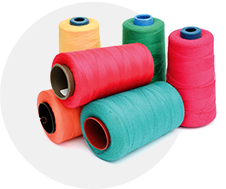VSF imports fall 65% as India cracks down on quality, Grasim strengthens market grip
In a sweeping transformation of India's textile industry, the enforcement of a rigorous Quality Control Order (QCO) in April saw imports of viscose staple fibre (VSF) plummet almost 65 per cent in less than a year. This significant drop, triggered by the QCO aimed at regulating the quality standards of VSF, reshaped market dynamics, propelling Aditya Birla Group-owned Grasim Industries to consolidate its market share to almost 95 per cent. Meanwhile, small and medium-sized spinning mills grappled with operational challenges as access to cheaper raw material imports became restricted.
Challenges for midstream buyers
Midstream VSF buyers, particularly small- and medium-sized spinning mills, voiced concerns over the hindrance posed by the QCO to their competitive edge, which relied on access to affordable VSF for spun yarn and fabric exports. These challenges compounded the woes of the textiles industry already besieged by economic distress amidst weak global demand.
Allegations surfaced against Grasim, the largest VSF producer, suggesting delays in the production of specialty VSF variants and engaging in unfair trade practices, including arbitrary discounts and preferential treatment for select buyers. In August 2021, the Competition Commission of India (CCI) issued an order accusing Grasim of abusing its dominant market position, a charge Grasim is currently contesting before the National Company Law Appellate Tribunal (NCLAT).
Grasim's lobbying efforts culminated in a meeting between its management and textiles minister Piyush Goyal, advocating stricter regulations on substandard VSF imports from China and Indonesia. The removal of the anti-dumping duty (ADD) on VSF further fuelled imports, prompting the enforcement of the QCO by the Central Board of Indirect Taxes and Customs (CBIC) in April 2023.
Impact on imports and market dynamics
The implementation of the QCO witnessed a dramatic decline in India's VSF imports, plummeting by 65 per cent to Rs 582 crore between April and December 2023. Notably, imports from Indonesia, the primary source of VSF imports until the QCO, nosedived by 99 per cent during the same period.
Grasim's dominance in the VSF market was underscored by its 95 per cent market share, bolstered by the QCO's restrictions on imports not compliant with Bureau of Indian Standards (BIS) certifications. Despite industry clamor for a reversal of QCOs on raw materials, regulatory focus remains on enhancing manufacturing competitiveness and ensuring quality standards across various sectors.
The allegations against Grasim, coupled with regulatory scrutiny and legal battles, underscored the complexities and challenges in navigating India's evolving textile landscape. Grasim's revenue from VSF and yarn sales surged in FY23, reflecting the company's formidable position amidst shifting market dynamics and regulatory interventions.
Indeed, the enforcement of the QCO heralded a seismic shift in India's textile industry, reshaping market dynamics and intensifying competition. Amidst regulatory scrutiny and industry allegations, Grasim emerged as a dominant player, navigating challenges while capitalizing on market opportunities. As the industry grapples with evolving regulations and market forces, the trajectory of India's textile sector remains intricately linked to ongoing efforts to balance quality standards, competitiveness, and regulatory oversight.

